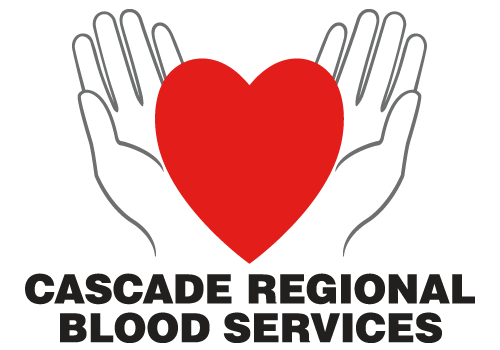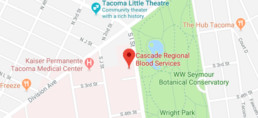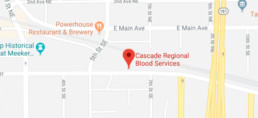Now is the Time to Become an Automated Blood Donor.
Automated blood collection is a special type of blood donation that allows a donor to give multiple blood components, such as red blood cells, platelets or plasma. During the procedure, all but the needed blood components are returned to the donor.
The type of blood donation that you are probably most familiar with is called whole blood donation. Automated donation can save three lives simultaneously.
Area hospitals are in critical need of blood; specifically, your blood platelets (PLATE-litz). They have the shortest life span of all your blood’s components, and are crucial in fighting chronic diseases, cancer, and traumatic injuries.
1) Make the Appointment.
Donating your platelets requires a special process—different from the process of donating whole blood—and that process is part of our Automated Blood Donation program. We can’t just take your donation of whole blood and separate it out later when it’s needed; you need to first sign up to be an Automated Blood donor. (The word “automated” refers to the technical process of blood separation, and has nothing to do with you!)
The good news is, becoming an Automated Blood donor is easy. And did we mention we need you RIGHT NOW?
2) A Scheduler Will Contact You.
Unfortunately automated donation doesn’t mean automated scheduling. Due to the nature of Automated Blood Donation, the timeframe of the donation process can vary by donor. That means we’ll need to contact you to schedule your donation.
3) Keep Your Appointment.
Patients in area hospitals need your lifesaving blood products. CRBS counts on you to keep your scheduled appointment so we can provide hospitals with the product they need and save lives in our community.
Fill out the form below to request an appointment, and a scheduler will get back to you shortly.
We frequently receive questions about eligibility to donate blood. We have compiled answers to some of the most common questions. If you need more information or would like to discuss eligibility further, please don’t hesitate to contact a donor specialist at 1-877-24-BLOOD.
AGE
If you are 16 or 17 years of age, you will need a signed parental permission to donate form.
WEIGHT
You must weigh at least 110 pounds to donate blood.
BLOOD PRESSURE
Your blood pressure must be between 180/100 and 90/50. Most high blood pressure medications are acceptable.
FREQUENCY OF DONATION
Whole blood can be donated every 56 days. Platelets can be donated every seven days, up to 24 times a year. Plasma can be donated every 28 days.
DONATION PREPARATION
It is important to eat a substantial meal and drink plenty of water or juice before donating. Avoid beverages with caffeine or alcohol before donating. It is also important to be well rested.
TRAVEL
Travel to tourist areas in most parts of the world is acceptable. You may be deferred for one year if you have traveled to a malarial risk area. Ask a donor specialist for the most recent information.
DENTAL WORK
You must wait 72 hours after a root canal, tooth extractions or periodontal procedure. There is no waiting period for cleanings or fillings.
IMMUNIZATIONS
There is no deferral period after a flu shot if you are symptom-free. However, other immunizations may have a two to four week deferral period.
PREGNANCY
You may donate six weeks after the end of your pregnancy, but not during.
DIABETES
If you have diabetes, and your condition is controlled by diet, oral medication or insulin, you may donate. For specific questions, please contact a donor specialist.
HEART DISEASE AND CARDIOVASCULAR ACCIDENTS
If symptom-free for at least six months, some donors with heart disease, recent heart surgery, heart attacks or CVAs are eligible to donate. This is evaluated on a case-by-case basis.
CANCER
People who have been successfully treated for some types of cancer are eligible to donate.
TATTOOS AND BODY PIERCING
You are eligible to donate after receiving a tattoo if the tattoo was performed in a licensed commercial establishment in Washington state. If you do not meet those criteria, you must wait one year to donate after getting a tattoo. Professional body and ear piercings are also acceptable when performed at a licensed commercial establishment. Otherwise, these are a one-year deferral.
ANTIBIOTICS
You must be off antibiotics for 48 hours and symptom free before donating blood. Antibiotics taken in low doses for preventative treatment or acne may be okay.
OTHER MEDICATIONS
Hormones, antidepressants, cholesterol, most blood pressure medications and other prescription medications are acceptable, as long as you are feeling well.
Cascade Regional Blood Services is your community blood center.
We have proudly supplied blood products to MultiCare Health System hospitals and health centers in Pierce and South King Counties since 1946. Volunteer donors supply 100 percent of the blood used at our community hospitals.



